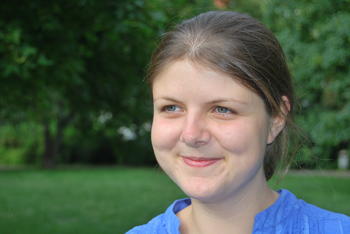Barbara Ogbone (Jahrgang 2011)

The impact of as-safar lil-ʿilm – translocal migration in search of religious education among Togolese Muslims
The impact of as-safar lil-ʿilm – translocal migration in search of religious education among Togolese Muslims
Islamic universities in Arabic countries have attracted Muslims searching to widen their knowledge about Islam for centuries. Famous institutions like the al-Azhar University in Egypt are considered as highly influential on Islamic scholarship. Very little is known though about the foreign students who have studied at such institutions and return to their countries. How will they transfer and implement the knowledge and experience they have gained during their studies in Arabic countries like Egypt, Saudi-Arabia, Libya, Kuwait or Sudan? In my dissertation I will look at cases of Muslims from Togo, West Africa, who have made the safar lil-ʿilm, a journey in pursue of Islamic knowledge and wisdom.
Research Focus
Togolese Muslim students study and have studied at various Islamic institutions in Arabic countries. They go on their journey with high expectations and imagine Arabic societies as fortresses of Islamic knowledge and piety. During their often very long stay abroad they are confronted with intercultural and intrareligious differences they have to come to terms with. These experiences influence their religious ideas, concepts and norms in various ways. Upon their return home to Togo they face the challenge of transferring their experiences and the knowledge they have gathered into a different context.
Muslims worldwide are not only diverse in their affiliations to different Islamic schools of law, confessions like Sunna or Shi’a, Islamic movements like the Wahhābīya, the affiliation to a Sufi brotherhood or an organization with a political agenda such as the Muslim Brotherhood. Differences are also due to the fact that Muslims are living in different societies with their specific historical backgrounds and cultural fields of meaning. Togolese migrants are faced with religious concepts, traditions and pious practices that differ from the local concepts and practices they know from their society of origin. Islamic universities such as the al-Azhar in Egypt are said to have a homogenizing influence on Islamic scholarship and therefore on Islamic culture worldwide. However, little is known about how graduates of such Universities bring together local forms of Islamic practice and culture with translocal claims of Islamic authority and the idea of a universal Islamic community (umma).
Research Questions
Togo being a non-Islamic country with only a limited amount of Islamic institutions and organisations, and Arabic not being one of the administrative or spoken languages, one can imagine that career options for graduates of Islamic universities are limited. Which institutions do they work for, and which positions do they hold in Muslim institutions and structures in their society of origin?
How did the students react to the encounter with their Arabic host societies, their cultural contexts and the forms of piety cultivated there? Did their attitudes and beliefs undergo transformations? Did they adapt to their hosts’ notions of Islam or maintain their distance?
Which motivations and expectations led them to undertake their journey? Which important experiences have they made? How will they influence the religious norms and practices in the Islamic milieus of their country of origin, Togo?
Research methods
During fieldwork on the ground in Togo, I will conduct interviews with graduates from different Islamic universities. To contextualize their narratives, further ethnographic research will be conducted in the social and professional environments of the graduates, with a focus on their religious activities and Islamic institutions they are affiliated with.
Togo is a West African country with a population of about 6,8 million people. It is not an Islamic country and Muslims constitute a minority estimated at 15 to 30 per cent of the population. The capital of Togo is Lomé. The dominant school of Islamic law (maḏhab) is the Malikīya. Various currents of Islam are present, such as the Shi’a or Aḥmadīya. The Tiğānīya Sufi-order plays an important role. Various Islamic associations are present in Togo, the most prominent being the Union Musulmane du Togo (www.umtogo.org). Few literature is available about Islam in Togo, most important being Raymond Delvals ‘Les Musulmans du Togo’ (Paris 1980).
Erstgutachterin: Prof. Dr. Dr. h.c. Gudrun Krämer
Zweitgutacher: Prof. Dr. Kai Kresse

